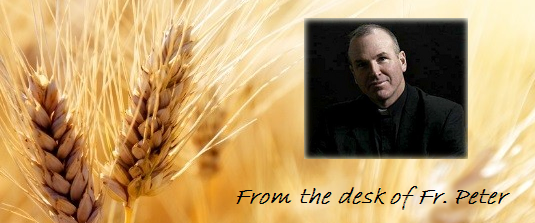May the peace of Christ reign in your hearts!
From the readings this weekend, I am reminded of the true sovereignty of Jesus and that in order for one to experience Jesus’ saving power, one must approach him in humble, sincere faith.
The message in the first reading from Isaiah foretells that God will replace someone of royalty because he is corrupt and guilty of neglecting his responsibility to provide care for the people. His replacement will be a servant of God and like a father to the people caring for them from the heart. God will sustain him and establish his rule firmly because he strives to follow God’s law and fulfill justice.
St. Paul praises the wonderful, mysterious wisdom of God and expresses his recognition that God, as creator of all, has sovereign dominion over all things, but more importantly is moved by love.
Jesus asks the disciples “who do people say that the Son of Man is?” Out of all the disciples, Peter is the first to make his profession of faith in Jesus as Son of God. Jesus recognizes that Peter’s faith is a gift from God and then Jesus establishes Peter’s faith as the foundation of the Church and extends to him the authority and responsibility to govern the Church with the promise that God will always sustain the Church.
As Catholics, this passage is a great comfort to us because we know that God, the source of all power and authority, has pledged that he will establish, protect, guide and sustain the Church forever. We also hold firm faith that Jesus’ promise of the Holy Spirit’s presence in the Church is a reality and that the bishops and the Pope are sustained and guided by God’s spirit in the duty of teaching and governing the Church. God fulfills this promise even when human beings fail, no matter if the one who fails is the pope, a bishop, a priest or a lay person. God sustains the Church in being and God is fully active in all the sacraments beyond any particular clergy or lay person.
Every one of us is invited, like Peter, to have an intimate relationship with Jesus: to love and experience Jesus’ love. Think about the forces that were part of the ancient world. Fear, sickness, political oppression and corruption, subterfuge, riots, violence and war, widespread poverty, pagan worship of idols and false gods topped off with demonic possession were common tensions that people had to live with. Jesus came as a healer, a teacher of truth, peace and justice and he showed God’s genuine love for the people. Many of us need to experience salvation on a daily basis from all the oppressive forces that are in our lives. Like Peter, we must come in sincere faith and ask Jesus for help. We experience deliverance in different ways: through prayer, community fellowship, Word and the sacraments mainly. But it is only through faith that we are able see and experience God’s presence in action around us and through us.
God bless you all! +++ Fr. Peter

